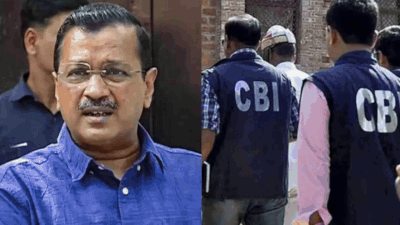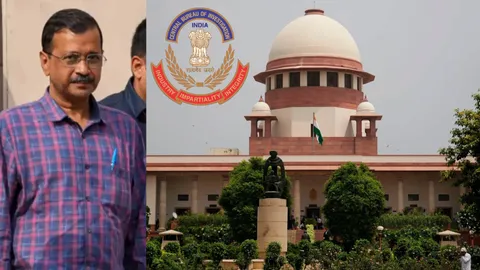| In Short |
| · The Supreme Court raised concerns over the CBI’s arrest of Delhi Chief Minister Arvind Kejriwal during judicial custody, questioning procedural lapses. |
| · Kejriwal faces charges in connection with alleged corruption in the now-scrapped 2021-22 Delhi excise policy, which investigation agencies claim benefited liquor lobbyists. |
| · His arrest was criticized as politically motivated by the Aam Aadmi Party (AAP), which claims the charges are part of an effort to derail Kejriwal’s political career. |
| · The Supreme Court questioned why the CBI arrested Kejriwal while he was already in judicial custody for a related Enforcement Directorate (ED) case. |
| · A decision on Kejriwal’s bail plea is pending, with the Court’s ruling expected to significantly impact the legal proceedings and political scenario. |
In a significant development, the Supreme Court of India has expressed its discontent over the way in which the CBI arrested Delhi Chief Minister Arvind Kejriwal. A legal battle is on over alleged irregularities in the Delhi excise policy, a case investigated by both the CBI and the ED. While arguments on Kejriwal’s bail application are being heard by the court, the legality of his arrest while on judicial custody is equally under the spotlight.
Controversy over Arrest
Arvind Kejriwal was arrested for the first time in March 2024 by ED in relation to an alleged money laundering case pertaining to now-junked Delhi excise policy. Later, he was sent to judicial custody. In June 2024, CBI arrested him on different corruption charges. Things started getting murkier when the Supreme Court asked the CBI why it had arrested Kejriwal without taking prior permission from the court when he was already in judicial custody. Senior counsel Abhishek Manu Singhvi, who appeared for Kejriwal, argued that this act of the probe agency violated the procedure of law.

The Case Background
Charges against Kejriwal stem from the 2021-22 Delhi excise policy, in which several AAP leaders were accused of creating policy loopholes for kickbacks from liquor lobbies. Money so obtained was used to fund the election campaign of Aam Aadmi Party in Goa, investigation agencies claimed.
Supreme Court’s Observations
During the hearing, the Supreme Court referred to some of the procedural lapses in the arrest of Kejriwal, indicating that the CBI overstepped its boundaries. The Court insisted that safeguards must be provided and that Kejriwal, being a constitutional functionary, neither presented any flight risk nor posed a threat to society. Through the remarks, the Court gave an inkling that the CBI failed to provide the substantial evidence for which Kejriwal should remain behind bars.

Justice Surya Kant, who headed the bench, remarked, “Once somebody is in judicial custody, only with prior permission from the court, further arrests can be made. There is a due process that has to be followed under the criminal procedure code.” These comments by the Court are a reflection of the Court’s concern about investigating agencies overstepping their limits.
The Triple Test and Political Sensationalism
Singhvi further went on to say that the arrest by the CBI seemed to be an “insurance arrest” to keep Kejriwal in jail despite getting bail in the ED case. He further went on to emphasize that the Delhi CM had already met the “triple test” criteria-he is not a flight risk, cannot tamper with evidence, and poses no threat to public safety. For instance, Singhvi highlighted that the co-accused in the excise policy case, Manish Sisodia and Sanjay Singh, were already out on bail (The Indian Express, 2023, August 10).
On the other hand, the CBI has been unyielding against the grant of bail to Kejriwal. The agency has stated that Kejriwal cannot be compared with the other co-accused and has charged him with dramatizing the case to achieve political mileage (
Political Implications
It is bound to be mired in a political controversy after the arrest of the serving Chief Minister. Aam Aadmi Party called this a move by the ruling government at the Centre to victimize opposition leaders. Further, the AAP leaders claimed that they have repeated several times that the Excise Policy had been scrutinized and approved by the relevant authority and these allegations are without substance.
For Kejriwal, this case is a big test because it has come at a time when the build-up to critical elections has already begun. His supporters claim that this is a serious attempt at stopping his growth, while critics are of the view that more seriously this action reflects something about corruption in his administration.
The Way Forward
While the Supreme Court deliberates over the legality of Kejriwal’s arrest and his bail plea, this order will set a big precedence in the investigation related to Delhi excise policy. Kejriwal remains imprisoned in Tihar Jail, whose fate is now to be decided by the Court, entailing all probabilities of serious legal and political consequences.
With the Supreme Court reserving its decision on the bail plea, the world is still left looking towards the next hearing that would come up with a final verdict on whether Kejriwal will be granted bail or not.
Conclusion
The arrest of Arvind Kejriwal by the Central Bureau of Investigation has created a national debate on not only the above charges but on the larger question of how investigating agencies work in politically sensitive cases. With the Supreme Court still closely examining the case, the stakes are high for Kejriwal and his political future.
For Latest News Updates Click Here
